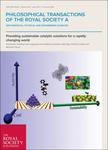版权所有:内蒙古大学图书馆 技术提供:维普资讯• 智图
内蒙古自治区呼和浩特市赛罕区大学西街235号 邮编: 010021

作者机构:Princeton Univ Dept Elect Engn Princeton NJ 08544 USA Rutgers State Univ Dept Comp Sci Piscataway NJ 08854 USA
出 版 物:《PHILOSOPHICAL TRANSACTIONS OF THE ROYAL SOCIETY A-MATHEMATICAL PHYSICAL AND ENGINEERING SCIENCES》 (Philos. Trans. R. Soc. A Math. Phys. Eng. Sci.)
年 卷 期:2008年第366卷第1881期
页 面:3699-3708页
核心收录:
学科分类:07[理学] 0701[理学-数学] 070101[理学-基础数学]
主 题:mobile computing programming interfaces run-time systems
摘 要:Increasingly, spatial awareness plays a central role in many distributed and mobile computing applications. Spatially aware applications rely on information about the geographical position of compute devices and their supported services in order to support novel functionality. While many spatial application drivers already exist in mobile and distributed computing, very little systems research has explored how best to program these applications, to express their spatial and temporal constraints, and to allow efficient implementations on highly dynamic real-world platforms. This paper proposes the SARANA system architecture, which includes language and run-time system support for spatially aware and resource-aware applications. SARANA allows users to express spatial regions of interest, as well as trade-offs between quality of result (QoR), latency and cost. The goal is to produce applications that use resources efficiently and that can be run on diverse resource-constrained platforms ranging from laptops to personal digital assistants and to smart phones. SARANA s run-time system manages QoR and cost trade-offs dynamically by tracking resource availability and locations, brokering usage/pricing agreements and migrating programs to nodes accordingly. Aresource cost model permeates the SARANA system layers, permitting users to express their resource needs and QoR expectations in units that make sense to them. Although we are still early in the system development, initial versions have been demonstrated on a nine-node system prototype.